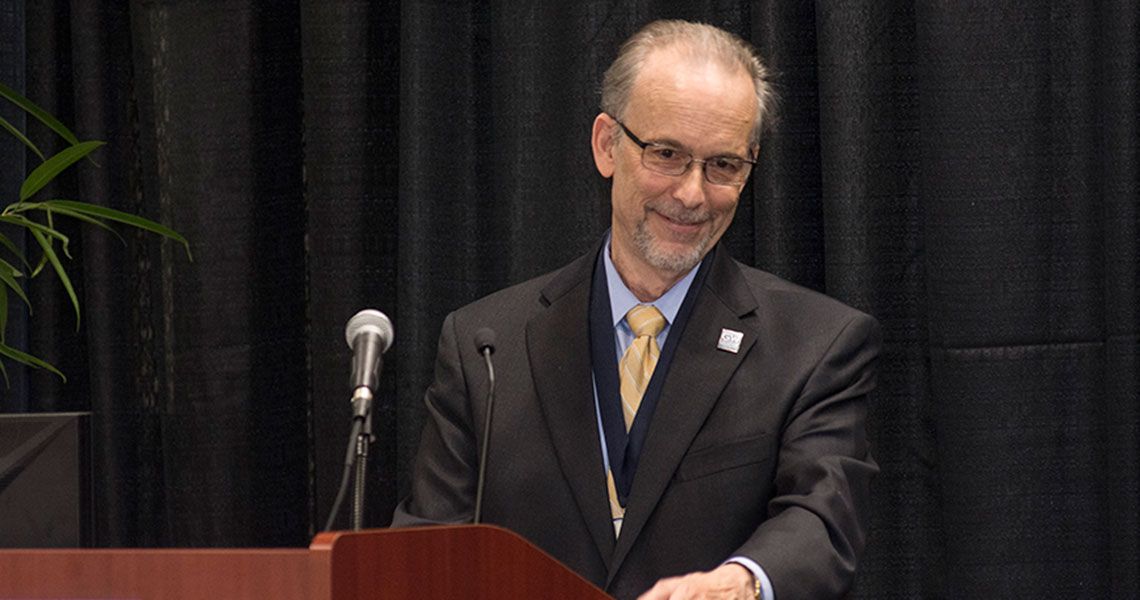In August 2013, Lawrence “Bopper” Deyton, MD ’85, MSPH, senior associate dean for clinical public health and professor of medicine at the GW School of Medicine and Health Sciences (SMHS), returned to his alma mater for a seminal event for medical students: the White Coat ceremony. As keynote speaker, Deyton found himself inspired by the students — “Today is one of the most humbling honors of all … your potential to do good in this world fills me with awe and hope for our future,” he said at the time — but he unwittingly inspired another.
“[We began to have] a series of conversations about the potential for having him come join us at the medical school,” recalled Jeffrey S. Akman, MD ’81, RESD ’85, vice president for health affairs, Walter A. Bloedorn Professor of Administrative Medicine, and dean of SMHS, adding that the two hoped to educate students on public health and healthy policy. “We created a new position specifically for Bopper, and then we turned him loose to create lots of more Boppers. [He’s] been unbelievably creative and enthusiastic. It’s really been a joy to have him join us.”
Deyton, whose path in public health and medicine has taken him from Capitol Hill to SMHS, with myriad placements at government institutions such as the Office of the Surgeon, the National Institutes of Health (NIH), and the FDA, was installed as the Murdock Head Professor of Medicine and Health Policy on June 5. Murdock Head, MD, DDS, JD ’58, was a professor emeritus at GW and founder of the Airlie Foundation and Airlie Productions; his son, Mark, MD ’82, was on hand to receive a copy of the medal presented to Deyton, who credited his success to his many mentors, including Akman and Anthony S. Fauci, director of the National Institute of Allergy and Infectious Diseases at the NIH.
“You have been my mentor for 30 years,” Deyton said to Fauci, who spoke at the event. “You have supported me, you have challenged me, you have squeezed every ounce of work out of me … I would not have this career without your support, guidance and friendship.”
The two initially met after Deyton’s move from an early career in public health into medicine. He had spent his 20-something years working in public health and as an advocate for LGBT health before entering medical school at SMHS in 1981. Once deep into his residency at the University of Southern California, Deyton was, Fauci recalled, “desperate to return to Washington, D.C., to work on HIV/AIDS” in the early days of the epidemic. Deyton subsequently applied for a competitive clinical associateship at the NIH, but on the eve of his interviews, the East Coast was shut down by a blizzard. He took the first plane he could to Dulles International Airport, and with no taxis available, he rented a limousine and rode to the NIH. The building, however, was empty, save for a building security guard and one man who didn’t believe in snowstorms shutting down the government.
“The guard almost didn’t let him in, but he insisted, pleading with the guard — and this is a true story — he knew how compulsive I am and that I would be there and went up to the seventh floor, knocked on the door,” Fauci said. “I opened the door, and there began a 30-year relationship.”
At the NIH, Deyton played a critical role during the height of the HIV/AIDS epidemic in the 1990s. He incorporated frontline community clinicians, who were struggling to learn how to best care for patients living with HIV, into the NIH AIDS research programs. He also oversaw NIH clinical research on the development and approval of antiretroviral drugs and treatment strategies, including the first trials of combination therapies, the cornerstone of current HIV treatments. When he received an offer to expand the HIV/AIDS program at the Department of Veterans Affairs national health system, he sought Fauci’s advice; his mentor told him, “Go with your gut.”
Now, after making the decision to transfer to SMHS from the FDA, where for several years he oversaw the implementation and enforcement of the Family Smoking Prevention and Tobacco Control Act, Deyton has built on his years of experience to create a new opportunity for the students that have inspired him: an immersion in clinical public health.
Today’s clinicians, Deyton believes, must be able to both care for their individual patients’ needs and identify, understand, and address community health needs. To craft those doctors, Deyton created the clinical public health curriculum, which integrates public health and population health throughout the four-year medical education.
Deyton has spearheaded a series of summits on critical public health issues — HIV/AIDS, obesity and childhood asthma — that allow students to engage with the community while devising creative solutions to complex problems. During the 2015 clinical public health summit on HIV, the students’ ideas were so impressive that one was included in Washington, D.C.’s HIV/AIDS Action Plan, “The 90/90/90/50 Plan: Ending the HIV Epidemic in the District of Columbia by 2020.”
Much like at his 2013 address, Deyton advised the students in the audience at his installation to follow his method. “Seek out the mentors here. ... Follow Dr. Fauci’s perfect role model as a scientist, clinician, leader, and advocate. Learn from and take on role models in the great faculty of the GW School of Medicine and Health Sciences and the School of Public Health, as well as leaders in Washington and those in policy and politics and advocacy. Learn from us, and in particular, learn from our mistakes. Become excellent clinicians for your patients, for your communities, for the nation, and for the planet.”
To see photos from the event, please visit the SMHS Facebook page.



